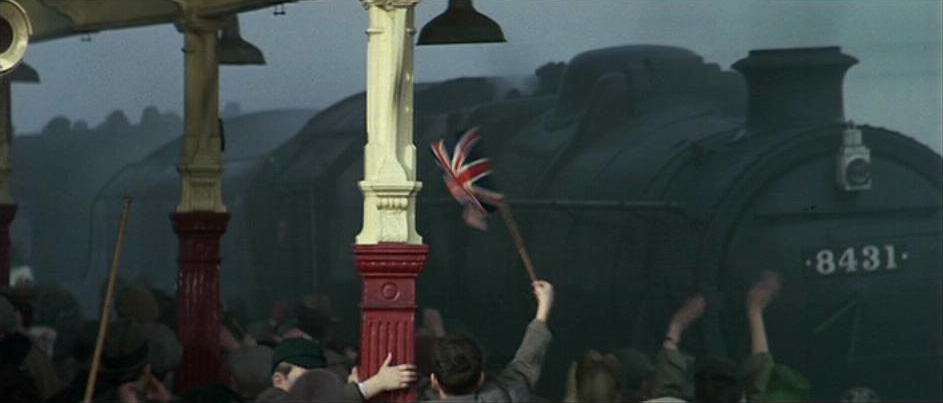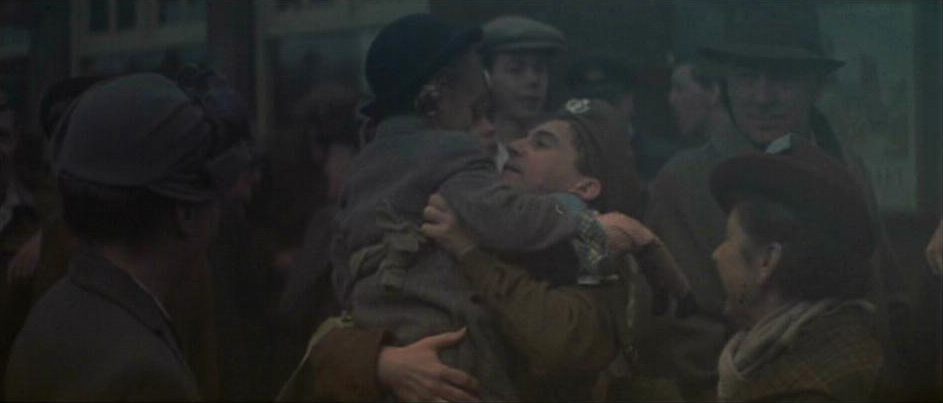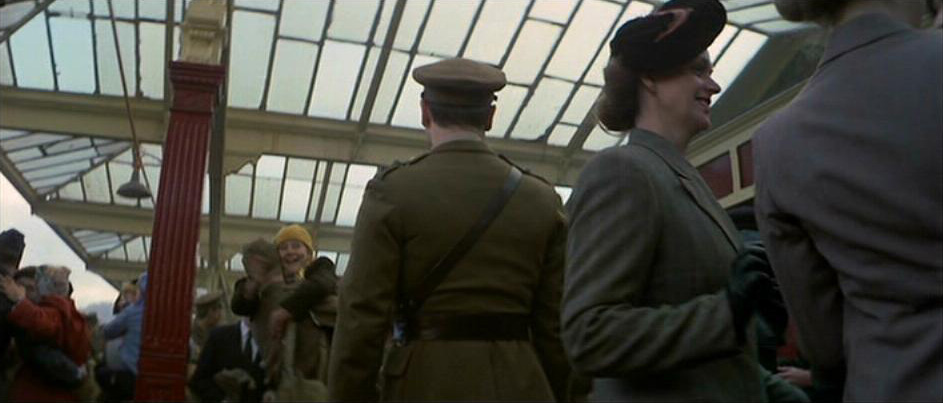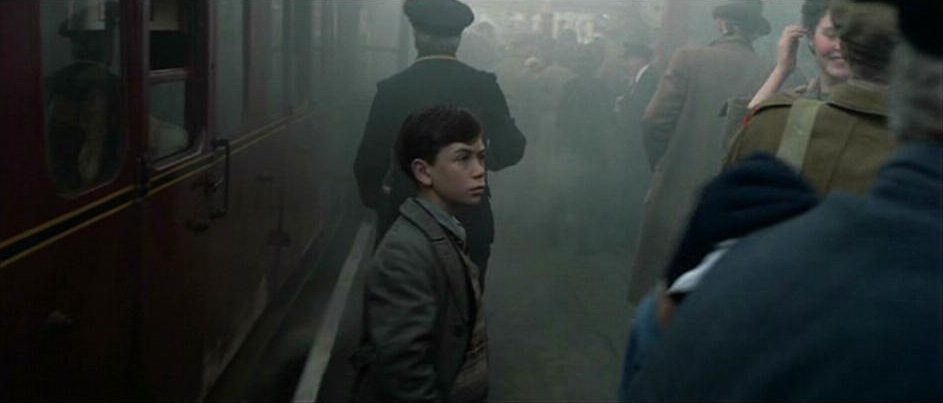Vera
[Roger Waters]Does anybody here remember Vera Lynn?
Remember how she said that
We would meet again
Some sunny day?
Vera! Vera!
What has become of you?
Does anybody else in here
Feel the way I do?
Song In A Sentence:
As he drifts further from reality, Pink yearns for ideas of home and reconnecting with his personal roots, recalling the hope that Vera Lynn – a World War II era singer – instilled within a country torn apart by war and loss.
V era Lynn was born Vera Margaret Welch on March 20, 1917 in London, England. Singing from an early age, Dame Vera recorded her first solo album at the age of 19, and by her mid-twenties had become the “the [Allied] Forces’ Sweetheart” through her radio broadcast, Sincerely Yours, in which she performed songs and sent messages of hope to the British soldiers serving abroad. In 1942, Lynn recorded a song written by Ross Parker and Hughie Charles entitled “We’ll Meet Again,” and went on to star in the lead role of a movie by the same name a year later. With its message of hope and loving reunion, the song became an instant favorite for soldiers leaving their loved ones behind, as well as those sending their fathers, brothers and sons off to war, uncertain if they’d make it back alive. Considered one of the most beloved songs of the World War II era, “We’ll Meet Again” has since been covered by a range of artists from the Byrds to Barry Manilow, and was put to brilliant, ironic use during the final scene of Stanley Kubrick’s satiric masterpiece Dr. Strangelove or: How I Learned to Stop Worrying and Love the Bomb. As for Vera Lynn, she has gone on to enjoy a most impressive career, and was appointed a Dame Commander of the Order of the British Empire in 1975. In September 2009 she became the oldest living artist (at the age 92) to have a #1 album on the UK album chart, with her collection We’ll Meet Again: the Very Best of Vera Lynn.
Yet despite her prominent and storied career, Pink begins “Vera” by asking “Does anybody here remember Vera Lynn?” Considering that Dame Vera has remained very much in the public eye throughout the decades, even hosting her own variety series on the BBC in the 1960s and 70s (the era when Waters / Pink were coming into their own), his question comes across as more rhetorical – or maybe just downright clueless – than anything else. Nevertheless, determined to reconnect with his past, Pink instantly recalls that voice of a generation – an era in which both he and the first bricks of his wall were created – and how “she said that we would meet again some sunny day,” alluding to the singer’s war-time rendition of the heartrendingly optimistic “We’ll Meet Again.” (The lyrics of Ross and Parker’s song are as follows, and can be heard here: “We’ll meet again / Don’t know where / Don’t know when / But I know we’ll meet again some sunny day. / Keep smilin’ through / Just like you always do / ‘Till the blue skies drive the dark clouds far away. / So will you please say hello / To the folks that I know / Tell them I won’t be long. / They’ll be happy to know / That as you saw me go / I was singing this song. / We’ll meet again / Don’t know where / Don’t know when / But I know we’ll meet again some sunny day.”) At first it seems a decidedly uncharacteristic turn for the largely nihilstic Pink to harken back to a message of hope, especially one that promises “blue skies [that will] drive the dark clouds far away,” when earlier in the album he bid “goodbye” to his own “blue sky” innocence. One might even be inclined to suggest that just as she was one of the lone rays of light during the bleak war, so, too, might her newly-remembered song offer some sort of solace to Pink as he faces his darkest moments behind his wall.
Considering Pink’s normally pessimistic nature, one is inclined to view the very next line as undercutting the allusion’s hints at optimism with the biting question “What has become of you?” If such is the case, the question isn’t aimed at Vera-Lynn-the-person so much as Vera-Lynn-the-idea, that post-war dream of homecomings and national prosperity. By this reading, Pink’s question might be reworded as “Vera, what has become of the reunions you promised? That hope that you embodied?” For innumerable families who lost family members to the war (the Pinkerton / Waters families included) the post-war dream was superficial at best, a futile hope that only resulted in despondency. Remembering Pink’s first life lesson in “In the Flesh?”, it’s interesting that he should return to this theme of hope and disappointment in this, his first song after regressing back to the past. Vera’s heartening assurance as well as England’s confidence that it would return back to its former, pre-war glory are revealed to be nothing more than empty promises in Pink’s eyes. The innocence of both the nation and Pink was stained by the deaths of countless brothers, sons, and fathers, the very souls that Ms. Lynn promised would return but didn’t…at least in this earthly realm. It should be noted that there are certainly otherworldly implications to the song’s lyrics, a sort of symbolic catchall in which the “sunny day” could refer to a heavenly reunion as much as an earthly one. But for a young Pink, and even an older one remembering the disappointment of his youthful expectations, such pie-in-the-sky dreams lead to disenchantment rather than personal contentment.
And yet one could argue the opposite with equal validity, especially in light of his apparent realization of the next song. Asking “What has become of you?” isn’t so much an attack on the emptiness of hope as it is a longing for a time when hope still existed in his life. Trapped by the bricks he has created, Pink pines for something to light the darkness – and who better than the Forces’ Sweetheart herself. After rejecting such sentimentality throughout his life, the notion of communal idealism doesn’t seem like such a bad idea when completely isolated from the rest of the world. By the time Pink asks if “anybody else in here feel[s] the way I do?”, the listener can no doubt insert any number of possible emotions into that general and unspecified feeling, be it nostalgia for a bygone era, hope for better times ahead, or the cold realization that hope is ultimately futile…all depending on how the listener interprets “Vera” as a whole. [Side note: Waters explores these themes of post-war hope and devastation in Pink Floyd’s highly underrated succeeding album The Final Cut: A Requiem To The Post-War Dream.]
These same themes of expectation and dejection are further detailed in the movie sequence for “Vera” in which adolescent Pink wanders through a train station of soldiers newly arrived from the battle front, anxiously hoping that his father is among them. One must keep in mind that the scenes depict Pink’s mental landscape rather than an actual memory, as he would have only been two-years-old when the war ended. Accordingly, the movie sequence is not so much a historically accurate return to the past as it is Pink’s symbolic regression to his life’s first pain / first brick, that realization of the futility of hope. Cinematically speaking, it’s only appropriate that “Vera” marks the beginning of Pink’s reversion to the origin of his suffering being that the movie itself began with Vera Lynn singing “the Little Boy That Santa Claus Forgot” even before introducing Pink as the main character. The scene is the physical emb0diment of Vera’s “We’ll Meet Again,” with sons embracing their parents and fathers their children. Everyone has returned, it seems; everyone’s prayers come to fruition. Everyone, that is, except for Pink, who tugs on the uniform of an unaccompanied soldier (an action reminiscent of the playground scene in “Another Brick In The Wall, Part 1”), expecting the face of his father to turn and greet him. But it’s not his father, who, as some part of Pink surely realizes, will never return. The young boy drifts back from the joyous crowd, dejected. Though the sequence and song’s message are short and simple, they are nonetheless powerful. Pink’s desire to “meet [his father] again some sunny day” is shattered, reinforcing the nihilistic idea that only pain prevails.
And yet it’s not all doom and gloom. Until now, nearly all of Pink’s fantasies have focused on the violence inherent in division; whether the schoolchildren revolting against their tyrannical teacher; the sexually emblematic flowers tearing at each others’ throats; even the schism of his rational and irrational selves as symbolically depicted in the previous song. Left on the outskirts though he is, Pink still imagines a sequence in “Vera” that is overwhelmingly communal. This is a coming-together far removed from the sort of nationalism that sent its citizenry off to war, but is founded on the very ideas of the love and hope that Vera sang about. Though the joy of the reunited families stands in stark contrast to Pink’s isolation on the train platform, it is joy nonetheless as envisioned by Pink himself – something that suggests a broadening of social consciousness. For once, this is a fantasy not based on violence and division, but of connection and bringing together.






